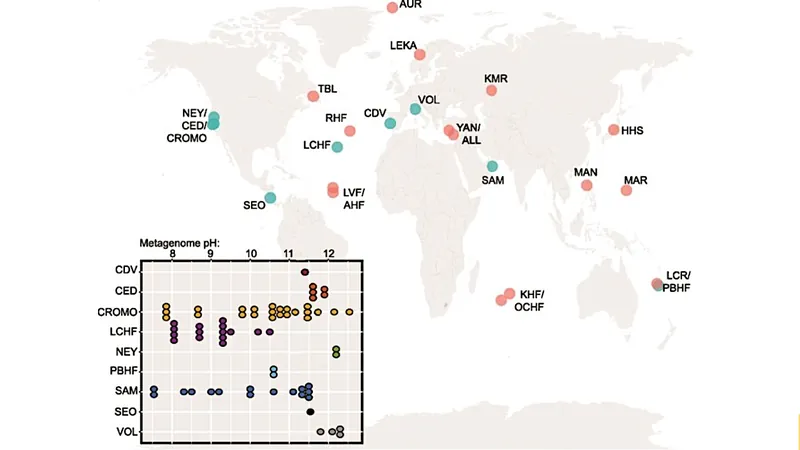
Exploring the Hidden Microbial World of Serpentinite: Insights into Life's Origins
2025-04-09
Author: Siti
Serpentinization, a fascinating geochemical process, occurs when ultramafic rocks are hydrated, setting off a chain reaction that has shaped our planet's history. Remarkably, this process isn’t just a terrestrial phenomenon; it’s believed to happen on various celestial bodies within our solar system.
This unique chemical reaction creates conditions that are both promising and perilous for life. On one hand, it produces a highly reducing environment that could lead to organic synthesis, potentially paving the way for life's emergence. On the other hand, these processes also generate hyperalkaline fluids that can be hostile, with limited availability of essential carbon and oxidants needed for life.
The significance of serpentinite environments is vast. They provide critical insights into understanding the earliest forms of life, the boundaries of habitable environments, and the potential for extraterrestrial life. Fascinatingly, it wasn’t until around two decades ago that scientists began recognizing the rich microbial communities thriving in these serpentinite ecosystems, particularly through the study of deep-sea hydrothermal vents.
In this exploration, we delve into the microbial ecology of ecosystems influenced by serpentinization, both in marine and continental settings. By analyzing publicly available metagenomic data, we gain a comprehensive view of how these microbial communities function and interact globally.
Despite the overarching themes found in diverse serpentinite ecosystems, local geological and hydrological factors introduce unique variations. This discovery raises several intriguing questions: Where does the carbon that supports microbial life come from? What are the physical and chemical limits of life in these extreme environments? How do these ecosystems evolve over time, and how do they compare to the serpentinites of early Earth?
By examining these questions through a microbial lens, researchers aim to identify critical gaps in knowledge that could drive future studies and uncover more about the origins of life on our planet and beyond.

 Brasil (PT)
Brasil (PT)
 Canada (EN)
Canada (EN)
 Chile (ES)
Chile (ES)
 Česko (CS)
Česko (CS)
 대한민국 (KO)
대한민국 (KO)
 España (ES)
España (ES)
 France (FR)
France (FR)
 Hong Kong (EN)
Hong Kong (EN)
 Italia (IT)
Italia (IT)
 日本 (JA)
日本 (JA)
 Magyarország (HU)
Magyarország (HU)
 Norge (NO)
Norge (NO)
 Polska (PL)
Polska (PL)
 Schweiz (DE)
Schweiz (DE)
 Singapore (EN)
Singapore (EN)
 Sverige (SV)
Sverige (SV)
 Suomi (FI)
Suomi (FI)
 Türkiye (TR)
Türkiye (TR)
 الإمارات العربية المتحدة (AR)
الإمارات العربية المتحدة (AR)